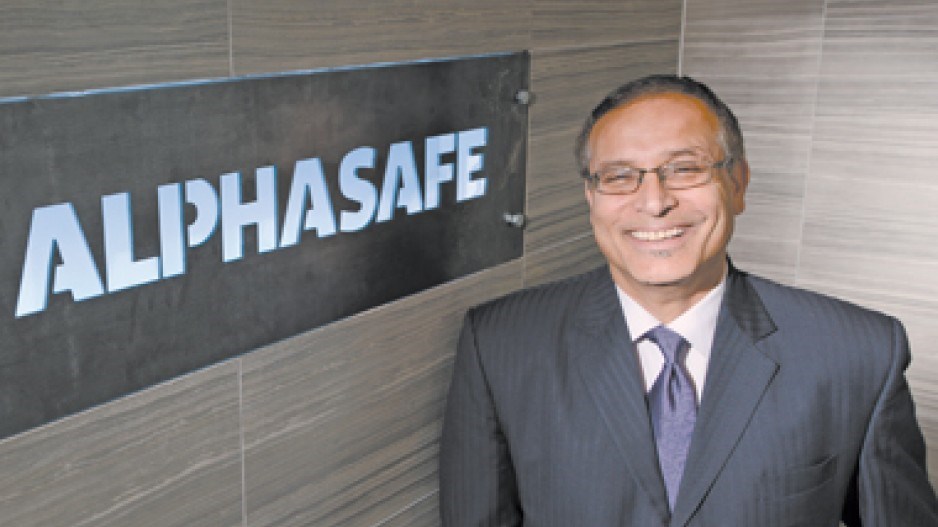When Joe Cheng got married in 2009, he and his wife received a number of expensive wedding gifts, as is customary in many Asian cultures.
Gold, jewels and other valuables are not the sort of thing they want stored in their apartment, so they went to their bank and applied for a safety deposit box.
“We were told they had a wait list – actually, a wait list to get on the wait list,” Cheng said. “We still haven’t got a call from the bank.”
So when Cheng was asked by Parminder Virk to join him in a new venture that provides an ATM approach to safe deposit boxes, he knew it was a business with potential. He’s now in charge of operations for AlphaSafe, which recently opened B.C.’s first privately operated safety deposit box business.
“We’re providing the concept of an ATM but with an overlaying of security and privacy,” said Virk, who is an engineer by training and founder and CEO of AlphaSafe.
It’s no accident Virk chose No. 3 Road in Richmond to open AlphaSafe. Not only is it in the heart of the city’s banking district, it’s also in an area with a high Asian population, where there appears to be a big unmet demand for safety deposit boxes.
“Within a two-block radius, I have every major bank and credit union, and every one of those has a waiting list of customers,” Virk said.
Jeremy Trigg, director of facilities management for Vancity Credit Union, said that’s not the case for Vancity.
“We have boxes available in Richmond today,” Trigg said. “And I also know that we’re in the middle of a fairly material renovation to the branch that will be finished in about February, and we will be adding a material number of safety deposit boxes to the branch at that time. And across Vancity, about 18% of our boxes are available right now.”
But even when safe deposit boxes are available, access to them is restricted to banking hours.
“You’re governed by the hours of the bank,” Virk said. “On top of that, you’re logged in and out, so you have to register somewhere and you have to wait for someone to come and open one of the locks. It’s very inconvenient, and not very private for most people.”
AlphaSafe is not a bank – it’s a privately owned high-tech vault that uses robotics to dispense safety deposit boxes to its customers 24 hours per day, seven days a week.
The SafeStore Auto system used by AlphaSafe is made by the Swedish company Gunnebo Security Group.
In a bank, a customer typically has to make an appointment to get into the safety deposit vault, and must be accompanied by a bank clerk, who has a second key. AlphaSafe is self-serve.
It uses four security features: A radio frequency identification (RFID) card, a password, a biometric fingerprint scan and a key.
The RFID card is used to get through AlphaSafe’s front doors, into the dispensing room and then to activate the dispenser. Unlike a bank’s safety deposit vault, there is no wall of boxes – just a kiosk and dispenser – and no attendant.
Clients activate the dispenser and plug in their password. The additional layer of security offered by a biometric fingerprint scan is optional.
Once activated, the client’s box is fetched robotically and comes up through a counter. The client uses his or her key to open the box, but can never take it out.
The vault has 441 boxes in three sizes, starting at $40 per month for the smallest and $80 a month for larger ones.
The safety deposit boxes are housed within a vault with eight-inch thick concrete walls, and not even Virk can get into it by himself.
The vault is controlled with two combinations. Virk has one; the other will be in the possession of a third party – likely the manufacturer, Virk said.
“It would be a four-eyes principle,” Virk said. “I cannot get in there myself because I won’t have both combinations.”
Should he ever need to open the vault – to retrieve contents when a client has stopped paying for the service or has died, for example – he would need to have the manufacturer send out a technician with the second combination. And because he has no keys to the boxes, he would have to drill out the lock on the box.
Automated systems are becoming popular in Europe, where some banks are getting out of the safety deposit box business altogether.
The BBC recently reported that several major U.K. banks have stopped offering safety deposit boxes to new customers, and that one of them – Barclays – is already winding down its safety deposit service.
Virk said banks are finding it harder to make a business case for offering safety deposit box service to their clients.
“In the past, a safe deposit box would anchor the client to that bank, but with the Internet you can move wherever you like. There’s a proliferation of private safe deposit box businesses opening up in England.”
Although there is a general need for safety deposit boxes, Virk said it is particularly high in Canada’s immigrant population.
In his own South Asian community, for example, gold is often given to brides when they marry, but Virk said many immigrants don’t like using banks for storing their valuables – even if they do make it to the front of the wait list.




